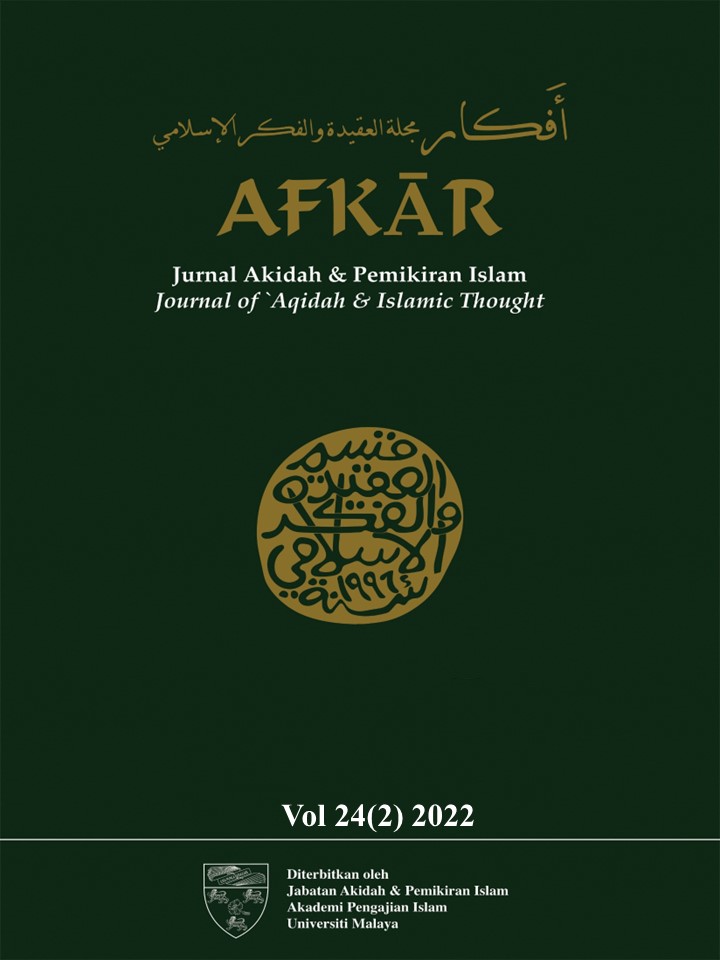The Practice of Islamic Psychospiritual Therapy in the Treatment of Drug Addiction at Rehabilitation Centres in Malaysia
Main Article Content
Abstract
Drug addiction is a global problem and it also poses a threat to Malaysia. The Malaysian government through National Anti-Drug Agency (NADA) has implemented various approaches to eradicate drug abuse by providing rehabilitation centers and rehabilitation programs. Private institutions have also taken the same initiatives. One of the approaches in the recovery process used is Islamic psychospiritual therapy for Muslim addicts. However, the psychospiritual therapy program used varies and requires a holistic and comprehensive model. This study employed the qualitative approach through interviews with treatment center operators, observations of treatment center activities and text studies. It was conducted at several governments and private drug rehabilitation centers namely Cure & Care Rehabilitation Centre (CCRC) Tiang Dua, CCRC Sungai Ruan, Pondok Remaja Inabah Negeri Sembilan, Teratak Tautan Kaseh Murabbi and Persatuan Pengasih Malaysia. The study has revealed that Islamic psychospiritual therapy takes into account three main concepts and components that are tazkiyah al-nafs (soul purification), basic religious knowledge, and a therapeutic support system. Islamic psychospiritual therapy is found to help the government, private institutions and individuals to achieve the recovery of drug addicts especially in addressing the issue of relapse in drug addiction for Muslim addicts.
Downloads
Article Details

This work is licensed under a Creative Commons Attribution-NonCommercial 4.0 International License.
References
Ab Rahman, Zaizul et al.. “The Factor of Religiousness in the Spirit of Unity among Adolescents Living in Malaysia Community.” International Journal of Business and Social Science 9(3) (2018): 75-80, https://doi.org/10.30845/ijbss.v9n3p8.
Abdullah, Zuraidah, Sa’ari, Che Zarrina & Chang, Lee Wei. “Transgenderisme Di Malaysia: Pelan Bimbingan Kembali Kepada Fitrah Dari Perspektif Psikospiritual Islam.” AFKAR: Jurnal Akidah & Pemikiran Islam 20(2)(2018):279–322. https://doi.org/10.22452/afkar.vol20no2.9.
Abu Hassan, Suhaimi, Yahya, Mohd Azam & Ibrahim, Ahmad Faqih. “Kesan Pelaksanaan Solat Terhadap Akhlak Mukallaf menurut al-Quran dan al-Hadith.” Jurnal `Ulwan 4 (2019): 100–115.
Adam, Fadzli, Wan Ibrahim, Wan Ahmad & Sudirman, Abdul Fatah. “Spiritual and Traditional Rehabilitation Modality of Drug Addiction in Malaysia.” International Journal of Humanities and Social Science 1(14) (2011): 175–181. http://www.ijhssnet.com/journals/Vol_1_No_14_ October_2011/24.pdf.
Agensi Antidadah Kebangsaan. Dasar Dadah Negara. Kajang: Agensi Antidadah Kebangsaan, Kementerian Dalam Negeri, 2019. https://www.adk.gov.my/wp-content/uploads/Dasar-Dadah-Negara-BM_compressed.pdf.
Akhmad, Akhmad et. al.. “Efektivitas Terapi Spritual Shalat dan Dzikir Terhadap Kontrol Diri Klien Penyalahgunaan Napza.” Health Information: Jurnal Penelitian 11(2) (2019): 77–90, https://doi.org/10.36990/hijp.v11i2.148.
Amin, M. Z.M.Zohdi, et al.. “A Literature Review of Spiritual Psychotherapy Using Quran Recitation in the Treatment of Drug Addiction.” Advanced Science Letters 23 (5) (2017): 4865-4868, https://doi.org/10.1166/asl.2017.8929.
Badri, Malik. “Contemplation: An Islamic Psychospiritual Study. London: International Institute of Islamic Thought -IIIT, 2001.
Al-Ghazali, Muhammad bin Muhammad. Ihya’ ‘Ulum al-Din. Cairo: Dar al-Taqwa li al-Turath, 2000.
Hashim, Norhisham Muhamad Azmil. “Pelaksanaan Biah Solehah dan Kesan Terhadap Penghayatan Akhlak Pelajar di SMKA.” Technical & Social Science 8(1) (2017), 25–43.
Ibrahim, Fauziah et al.. “Faktor Menyumbang kepada Penagihan Relaps dalam Kalangan Penagih Dadah PUSPEN di Semenanjung Malaysia.” Jurnal Antidadah Malaysia 5(1) (2009): n.p.
Isgandarova, Nazila. “Muraqaba as a Mindfulness-Based Therapy in Islamic Psychotherapy.” Journal of Religion and Health 58(4) (2019): 1146-1160, https://doi.org/10.1007/s10943-018-0695-y.
Al-Jawziyyah, Ibn Qayyim. Ighathah al-Lahfan min Masayid al-Shaytan. Beirut: Dar al-Ma‘rifah, 1975.
Khairani, Zakaria @ Hamid. “Kaedah Pembangunan Akhlak Remaja Menurut Imam al-Ghazali: Aplikasinya dalam Program Tarbiah Sekolah-Sekolah Menengah Aliran Agama Berasrama di Negeri Kedah, Malaysia.” Jurnal Kajian Pendidikan (ATIKAN) 2(1) (2012): 79-94.
Khalid, Muhammad Yusuf. “Psycho-Spiritual Therapy Approach for Drug Addiction Rehabilitation.” Jurnal Antidadah Malaysia 3&4 (2008): 143–152.
Mat Jusoh, Mohd Suhardi & Mohd Sharif, Mohd Farid. “Pembangunan Spiritual dalam Pelaksanaan Program Tarbiah di Asrama Sekolah-Sekolah Menengah Kebangsaan Agama (SMKA) Pulau Pinang.” AFKAR: Jurnal Akidah & Pemikiran Islam 20(2) (2018): 127-158, https://doi.org/10.22452/afkar.vol20no2.4.
Mazlan, Muslihah et al.. “Fardhu ‘Ain Sebagai Kerangka Pembentukan Disiplin Pelajar di Institusi Pendidikan Islam.” Jurnal Ulwan 1 (2016): 59-73.
Minhat, Aemy Liza. “Hubungan Makanan dan Pemakanan Halalan Toyyiba dengan Akhlak.” Master thesis, Universiti Teknologi Malaysia, 2014.
Mohd Rushdan & Ahmad Bukhari. “Integrasi Terapi Psikospiritual Islam dalam Modul Rawatan dan Rehabilitasi Berasaskan TC (Therapeutic Community).” Paper in International Drug Prevention and Rehabilitation Conference, 2015: 98-107 https://doi.org/10.1080/00306525.1988.9633699.
Noordin, Zidni Nuran & Ab. Rahman, Zaizul. “Perbandingan Proses Tazkiyah al-Nafs Menurut Imam Al-Ghazali dan Ibnu Qayyim.” Jurnal Al-Turath 2(1) (2017): 37–46.
Othman, Zarina, Idris, Nor Azizan & Druis, Mohamad Daud. “Penyalahgunaan Dadah Sebagai Ancaman Keselamatan: Analisis Keberkesanan Program Kerajaan Dalam Mengekang Pengrekrutan Penagih Dadah Di Malaysia.” Geografia: Malaysian Journal of Society and Space 11(13) (2015): 60–71.
Pargament, Kenneth I. & James W. Lomax. “Understanding and Addressing Religion among People with Mental Illness.” World Psychiatry 12(1) (2013): 26-32, https://doi.org/10.1002/wps.20005.
Pawanteh, Wan Mahmood. “Penyelarasan Jentera Perlaksanaan dalam Bidang, Peranan dan Penglibatan Masyarakat dalam Usaha Membenteras Dadah.” Paper in Konvensyen PEMADAM Kebangsaan. Kangar: Kolej Universiti Kejuruteraan Utara Malaysia, 1988.
Sa’ari, Che Zarrina & Zaini, Nor Azlinah. “Terapi Spiritual Melalui Kaedah Tazkiyah al-Nafs oleh Syeikh Abdul Qadir al-Mandili dalam Kitab Penawar Bagi Hati.” AFKAR: Jurnal Akidah & Pemikiran Islam 18 (Special Issue) (2016): 75–90.
Sa’ari, Che Zarrina. “Peranan Penyucian Jiwa (Tazkiyah al-Anfus) Terhadap Pembangunan Insan dalam Masyarakat Bertamadun.” Paper in Seminar Tasawuf Negeri Sembilan 2007, Jabatan Mufti Kerajaan Negeri Sembilan Darul Khusus, 2007, http://www.muftins.gov.my/v1/en/2019/04/19/peranan-penyucian-jiwa-tazkiyah-al-anfus-terhadap-pembangunan-insan-dalam-masyarakat-bertamadun/.
Saiful Amri et al.. “The Role of Former Drug Abuser in the Management of Drug Treatment Center Using Psycho Spiritual Therapy in Malaysia and South Thailand: A Comparative Study.” International Journal of Asian Social Science 9(1) (2019): 106–113, https://doi.org/10.18488/journal.1.2019.91.106.113.
Seghatoleslam, Tahereh et al.. “Achieving a Spiritual Therapy Standard for Drug Dependency in Malaysia, from an Islamic Perspective: Brief Review Article.” Iranian Journal of Public Health 44(1) (2015), 22–27.

